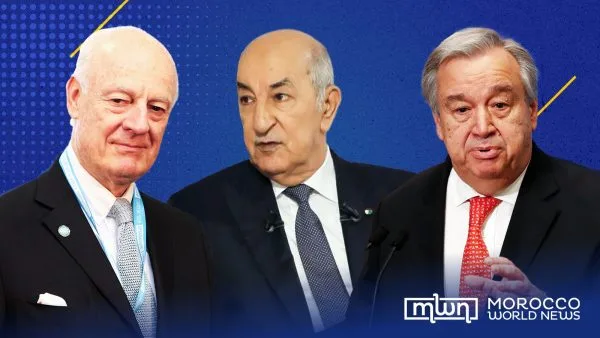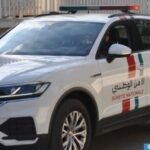Rabat -Despite the resolutions of the UN Security Council, Algeria continues to block the UN roundtable from Talk initiatives for western Sahara and shake its responsibility as one of the four main parties of the western Sahara dispute.
The Algerian Foreign Minister Ahmed Attaf renewed the reluctance of his country to get involved in the Staffan de Mistura of the West Sahara on Sunday during a meeting.
After a opinion From the Algerian Ministry of Foreign Affairs, Attaf confirmed “Algeria’s full support for the efforts of the UN Secretary General Mr. Antonio Guterres and his personal envoy, Mr. Staffan de Mistura, who aimed to burden the political settlement process of the conflict in the western Sahara on the basis of the legality related to decolonization.”
Attaf repeated his country’s attitude that they are not a party for the dispute.
De Mistura’s meeting with Attaf is part of his regional visit to discuss the dispute with the main parties of the Sahara dispute in the middle of a stagnation at the United Nations level, which continues to put pressure on the Algerian regime in order to find an agreed political solution to end the dispute.
No surprise, but it damages the process
Despite its direct participation, the regime in Algeria prefers to describe itself as it houses the independence claims of Polisario, finance, weapons and supports the demands of Polisario.
Despite this direct participation, Algeria has repeatedly refused to get involved in round tablele discussions that were initiated by the UN and bring together all parties to discuss and consider a realistic and pragmatic solution.
Algeria’s reluctance was documented in several resolutions by the UN Security Council and reports from the UN Secretary General.
In his last report about Western Sahara Last year Guterres realized that Algeria rejected his role in the dispute.
“On February 27, 2024, my personal envoy met with the Minister of Foreign Affairs of Algeria, Ahmed Attaf, Algier, Algeria. On April 16, he met again with Mr. Attaf over the margin of the minister in New York in the affairs of the Security Council.”
In particular, the continued focus of Algeria After “ensuring that the people of the Wester Sahara has the right to self-determination,” added the UN boss and quoted the Supreme Algerian diplomat in order to insist that his country is not a party of the conflict.
The resolutions of the UN Security Council, including the latest resolution 2756, asked all parties to work together better, a claim that has long been ignored by Algeria’s regime.
The Security Council critically recognized that achieving a political consensus would contribute to the stability and security of the region.
Algeria’s claims: separated from reality
Morocco has long suspended the reluctance of Algeria to assume his responsibility in the dispute.
In November last year, King Mohammed VI Morocco confirmed unshakable engagement to protect the country’s sovereignty from the southern provinces.
In a speech that Algeria not mentioned by name, the monarch unmistakably referred to the country’s enemy attitude in the territorial integrity of the country and raised the refusal of Algeria to carry out a census in Tindouf camps.
The king emphasized that the cling to the independence referendum is to remain in another “world that is clearly separated from reality” and “outdated theories and demands”.
The king also asked the UN to take more brave measures in the countries in order to distinguish between reality between real or legitimate worlds and “frozen worlds”.
“Now it is time for the United Nations to take on their responsibility and the biggest difference between the really legitimate world represented by Morocco in his Sahara, and a world that is frozen in time and have been frozen by the reality and developments that have taken place,” said the monarch.
Omar Hilale, Morocco’s constant ambassador in the United Nations, repeated the same comments in October last year and rejected the attempts in Algeria to undermine the territorial integrity of Morocco.
“It is Algeria that created the Polisario, it is Algeria that financed the Polisario, Algeria, which pays the polisario, and with Algerian passes, the separatists of Polisario travel around the world,” said Hilale, noting that the headquarters of the separatist group, the Tindoufove camps, also in the TiDouff -Camps in Algerian Camps.
Morocco emphasized his four fundamental Principles during his previous meetings with de Mistura.
The principles include the support of Morocco for the non-managed political process in order to find a political solution that is acceptable to both sides, and focuses on the continuity of non-sponsored circular discussions dispute.
Another key reason is the autonomy plan in Morocco the only political solution to end the dispute.
Morocco repeated his strict respect for an armistice of all parties as a prerequisite for the continuation of the political process





